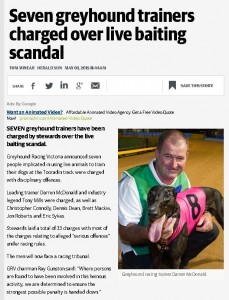Critical incident response advice. Also known as damage control.
PR crises happen; and when they do, damage control is required. Even if your organisation pays no attention to communications, invest time and energy considering how you will cope with negative attention.
Negative publicity can quickly undo years of good work. Critical incident response (CIR) planning is as close to reputation insurance as you can get. Some damage control advice:
See it coming. When I ask clients to imagine a crisis most of the suggestions are bolts from the blue – fires, injuries, takeovers, resignations. Unexpected, unwelcome, unavoidable and undeserved situations.
Unexpected crises do happen but most of the crises with which I have dealt are not at all surprising to those in the know. Expectable crises occur when disgruntled staff, volunteers or clients are ignored; dodgy financial transactions are undisclosed and poor work practices are tolerated. These are slow burning crises awaiting a puff of wind to ignite.
Slow burning crises are confronting to consider as they are not blameless.
I recently asked a group of 30 leaders – most of which head organisations that work with volunteers, children, public funding, dangerous activities – whether they could see the embers of a crisis glowing. None did. Perhaps they were being discreet but I did remark to them that it was highly unlikely that such a collection of organisations did not have something damaging en route to their front door. What’s that saying about stitches in time?
The origin of your crisis may have nothing to do with you. Crises may be inspired by a media investigation, community group or academic study. For example the greyhound industry – not a favourite of Hootville’s – was shaken to its foundations with the release of undercover reporting by Animals Australia which then worked with ABC-TV’s 4 Corners to create a national furore. Overnight the industry went from being the recipient of millions of taxpayer dollars to a national disgrace.
Animals create passion – if you are exposed to animal welfare issues – you may find yourself in the midst of a crisis. This applies equally to pony clubs and hamburger franchises. No animal cruelty to be concerned about? What else have you got to fear?
Gender and sexuality: in 2016 we have never been more aware of these issues. How well would your organisation stand up to scrutiny of your gender diversity at participant, employee or board level? What would happen if one of your franchises, clubs or schools had to deal with a female customer / participant / student who wishes to change gender?
Social media: it is now fair game to hold entire organisations accountable to the social media rants of one staff member about issues that do not pertain to the mission of your organisation. Even if that rant was made in private time.
Related-party transactions: Many boards have directors with business dealings with the organisation that they serve. In many instances that’s entirely justified on many occasions it could cause you pain.
Child protection / physical abuse: the cone of silence has lifted and people rightfully have long memories. Are your policies and practices ready to stand scrutiny.
Faith-based and tax-free: religious nonprofits need to be able to justify their tax -free status. Particularly when they compete for business alongside private enterprises.
IR: paying staff half the mandated rate? Expect twice the crisis.
In short, crises are many and varied and given enough time, inevitable. They may be warranted, they may be not – that hardly matters.
Officially declare a crisis. When you identify a crisis it needs to be declared as such and all your VIPs alerted to the fact that the crisis plan is now in effect. Have a specific crisis plan and stick to it. Many aspects of your plan are covered in this blog post.
Correct the mistake ASAP. If you have made a mistake – admit it. Don’t lie, half apologise, stay silent or grumble. If media or a third party is in error correct it swiftly and without room for misinterpretation. See how to make an apology.
Have a single point of contact for media. Media and other enquiries might be made through any variety of channels. The dastardly media may well approach your staff or volunteers in the most unlikely of situations hoping to get a comment. Tell all staff and stakeholders to refer media inquiries to the anointed media person.
Have a single, trained spokesperson. This may not be the boss. It should be someone across the issues, with real authority who can communicate to the media effectively. Note that in Australia it is less common for organisations to have a designated media spokesperson and it will be counted against you if your spokesperson isn’t your leader.
Address just the key issues with specific, refined messages when speaking to stakeholders or media. This is not the time to address broader criticisms of your organisation.
Use press conferences and door-stop interviews as ways to communicate your message. They give you maximum control. (That’s why they are used by corrupt cricketers and punch-happy footballers.) Press releases and written statements look defensive though it is likely you will use them in a crisis. Despite your natural reluctance to go public in any crisis it’s important to create the impression that you are happy to communicate.
Have a remedy. It is vital for leaders and CEOs to demonstrate specific actions they are taking to make the crisis better.
Fundamentally unethical franchise 7-Eleven recently attempted to demonstrate their willingness to take action by appointing Prof Alan Fels to an independent committee to redress their systematic and long-term underpayment of workers.
It was the beginning of their remedy to deal with the crisis that was years in the making and entirely their own fault. Prof Fels is one of our most trusted citizens and his appointment showed that 7-Eleven was taking the matter seriously. This of course ended with the termination of his engagement.
A private Australian fundraising consultancy recently contacted Hootville to discuss a crisis that had been brewing for a long time. You guessed it – the underpayment of their employees.
Brett advised the CEO that it was vital to calculate the underpayments that would belatedly be made to underpaid staff. This, I instructed, would show both remorse and responsibility. Without being able to demonstrate a remedy it would be difficult to demonstrate remorse. Strangely the conversation ended shortly after this recommendation.
Make sure you can genuinely claim to have taken specific action before making your public apology. Talk to people, call a meeting, send a cheque, call in the external consultants ASAP and you’re already three steps down the road to putting the crisis behind you.
Throw out the bad apple. Too often we see organisations defend the indefensible. Churches, unions, ethnic associations and big corporations regularly do this. The public will respect an organisation that is willing to make the hard decisions.
Prioritise your key audiences such as staff, volunteers and donors – as they will follow the story more closely than strangers. Media isn’t the way to reach these people – ideally you’ll be able to talk to people face-to-face or on the phone though it is likely you’ll have to resort to your website or email.
When a crisis hits you need clear healthy communications channels to your key stakeholders. It’s too late to start building up a media list or an email database of your stakeholders. These need to be put in place long before the proverbial hits the fan.
Media management. Media is an accelerant to any crisis. Here is some confusing advice: sometimes you can snuff out a crisis by delay, refusing to share information and keeping the crisis close to your chest. You may even seek legal action to keep things quiet. Sometimes this works, as it did for the Catholic Church for decades. However if your crisis eventually becomes public your delay compounds the sin in the eye of the public. So if you have any intention of going public with your crisis go public earlier rather than later
Don’t think that your past media experience will hold you in good stead. Some organisations can get accustomed to soft, supportive media. C.I.R media is different. You’ll be speaking to different media and different journalists with different expectations and attitudes.
Have a non-perishable story in your bottom drawer. This is a story (obviously positive) that can be told at any time. Use it to deflect attention.
Finally – a crisis is an opportunity. Plenty of individuals and organisations have faced crises and lived to play another day. Bankruptcies, allegations of sexual assault, infidelity, salary cap breaches, mass resignations, exploding appliances, workplace deaths and politically incorrect gaffes have failed to derail the careers and corporate profits of many. How openly and effectively you deal with your crisis will have a huge impact as to how well you rebound.





